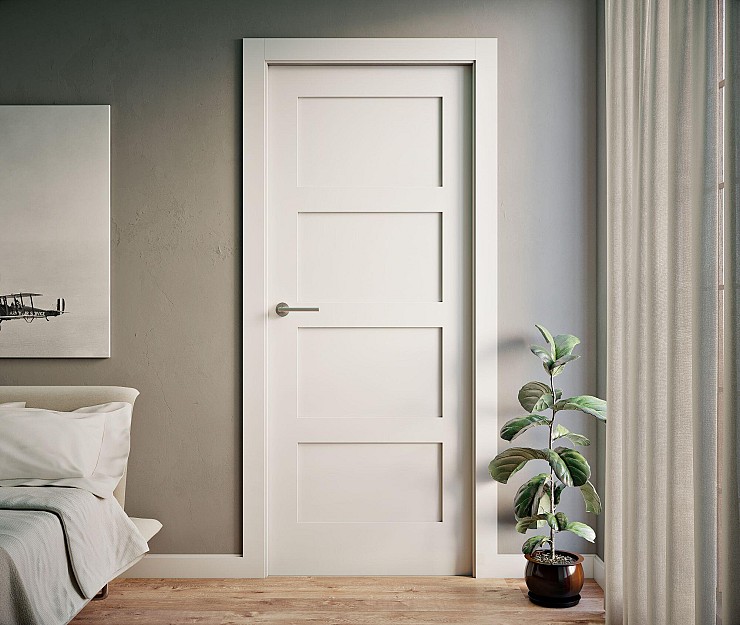Top 5 Mistakes to Avoid When Choosing a Bedroom Door

When it comes to designing or renovating your home, the bedroom door is often overlooked. However, it plays a key role in ensuring privacy, enhancing the aesthetics of the room, and even improving functionality. A poorly chosen door can lead to issues such as lack of soundproofing, mismatched decor, or even durability problems.
This guide will walk you through the top 5 mistakes to avoid when choosing a bedroom door, helping you make an informed decision that balances style, practicality, and budget. Whether you're selecting a door for a cozy master bedroom or a guest room, avoiding these mistakes can save you time, money, and frustration.
Ignoring the Door Material
The material of your bedroom door is one of the most critical decisions to make. It directly impacts the door’s durability, appearance, soundproofing, and cost. Many homeowners fail to consider the specific needs of their bedroom and end up with a door that either wears out quickly or doesn’t meet their expectations.\
Common Door Materials and Their Features
| Material | Durability | Sound Insulation | Cost | Best For |
| Solid Wood | High | Excellent | $$$ (Expensive) | Premium look, high durability |
| Hollow Core | Low | Poor | $ (Affordable) | Budget-friendly, lightweight |
| MDF (Medium-Density Fiberboard) | Medium | Good | $$ (Moderate) | Smooth finish, paintable surfaces |
| Glass (Frosted or Clear) | Medium | Poor | $$$ (Expensive) | Modern aesthetics, natural light |
| Metal | High | Good | $$$ (Expensive) | Industrial look, durability |
Why Material Matters
- Durability: Solid wood doors last longer but are heavier and more expensive. On the other hand, hollow-core doors are lightweight and affordable but can chip or dent easily.
- Soundproofing: Bedrooms require peace and quiet, and the material plays a significant role in blocking external noise.
- Aesthetics: The material determines how the door looks and whether it complements the room's design.
Mistake to Avoid:
- Choosing a hollow-core door for bedrooms where soundproofing and durability are essential.
- Opting for glass doors without considering privacy concerns.
Overlooking Soundproofing
Bedrooms are personal spaces that require privacy and peace. Soundproofing is often ignored when selecting a door, leading to disturbances from external noise or lack of privacy within the house.
Why Soundproofing Matters
Noise Reduction: A soundproof door ensures restful sleep by blocking noise from common areas, such as the living room or kitchen.
- Privacy: Bedrooms should feel like personal sanctuaries. A poorly soundproofed door can compromise this, especially in shared living spaces.
Comparison of Soundproofing Levels
| Door Type | Soundproofing Level | Description |
|---|---|---|
| Solid Core Doors | High | Dense material effectively blocks sound. |
| Hollow Core Doors | Low | Lightweight and less effective at insulating sound. |
| Glass Doors | Very Low | Poor sound insulation; better suited for shared spaces. |
| Acoustic Doors | Very High | Specialized doors designed for maximum soundproofing. |
Common Mistakes:
- Installing Hollow-Core Doors: These doors are affordable but provide poor sound insulation, making them unsuitable for bedrooms in noisy households.
- Ignoring STC Ratings: The Sound Transmission Class (STC) rating measures how well a door reduces noise. Many people skip checking this rating, leading to poor choices.
Choosing the Wrong Door Style
The style of the door is not just about aesthetics—it also impacts the functionality and usability of the space. Many homeowners select a door style based solely on its appearance without considering whether it fits the room’s layout or meets practical needs.
Factors to Consider When Choosing a Door Style
- Room Size and Layout: The available space in the room determines which door style will work best. For example, hinged doors require more clearance to swing open, while sliding or pocket doors save space.
- Privacy Needs: Bedrooms require a higher level of privacy, which some door styles (like barn doors or sliding doors) may not provide adequately.
- Noise Reduction: If soundproofing is a concern, avoid door styles that leave gaps, such as barn doors or poorly installed sliding doors.
- Ease of Use: Ensure the door style is practical for daily use. For instance, pocket doors can be difficult to open and close for children or elderly individuals.
Common Door Styles to Consider
- Hinged Doors: Classic and versatile, these doors work well in most bedrooms, provided there is enough space for them to swing open.
- Sliding Doors: Ideal for small rooms or modern designs, sliding doors save space but may offer limited soundproofing.
- Pocket Doors: These doors slide into the wall cavity, making them perfect for compact spaces. However, they can be expensive to install and difficult to repair.
- Barn Doors: A trendy choice for farmhouse or industrial decor, but they lack privacy and soundproofing, making them unsuitable for bedrooms requiring quiet.
- Bifold Doors: Commonly used for closets, they are not ideal for main bedroom doors due to their lower durability and soundproofing.
Mistakes to Avoid
- Installing barn or sliding doors in bedrooms where privacy and soundproofing are essential.
- Choosing pocket doors without considering the cost and complexity of installation.
- Selecting a door style that clashes with the room’s decor or layout.
Neglecting Proper Measurements
One of the most common—and frustrating—mistakes is failing to measure the door frame accurately. Even a small error in measurements can result in a door that doesn’t fit properly, leading to installation delays, additional costs, and poor functionality.
Key Measurements to Take
- Door Frame Width: Measure the width of the door frame at the top, middle, and bottom to ensure consistency.
- Door Frame Height: Measure the height from the floor to the top of the frame on both sides.
- Door Thickness: Check the thickness of your existing door or the frame to ensure compatibility.
- Swing Clearance: For hinged doors, measure the clearance needed for the door to open fully without obstruction.
Common Problems from Incorrect Measurements
- Gaps Around the Door: If the door is too small, it leaves gaps that reduce soundproofing and privacy.
- Door Doesn’t Close Properly: A door that is too large or misaligned won’t close securely, causing frustration and potential damage.
- Costly Adjustments: Customizing a door to fit incorrectly measured frames can significantly increase costs.
Mistakes to Avoid
- Assuming standard door sizes will fit your frame without measuring.
- Forgetting to account for flooring changes, such as adding carpets or tiles, which can affect the door height.
- Skipping measurements for swing clearance, which is essential for hinged doors.
Don’t Forget About Noise Control
Peace and quiet are essential in a bedroom, but many homeowners underestimate the importance of soundproofing when selecting a door. This oversight can lead to unwanted noise disruptions that compromise the comfort of the space.
Simple Ways to Reduce Noise
- Opt for Solid Doors: Solid wood or medium-density fiberboard (MDF) doors are far superior to hollow-core doors when it comes to blocking sound.
- Seal the Edges: Weatherstripping around the door frame and a door sweep at the bottom can block gaps where sound travels through.
- Upgrade the Frame: A poorly constructed or loose door frame can amplify noise. Reinforce the frame or add insulation for better results.
- Extra Soundproofing Options: Acoustic panels or sound-dampening curtains near the door can further reduce noise infiltration.
Common Oversights
- Installing lightweight, hollow-core doors that offer minimal sound insulation.
- Overlooking the gaps around the door frame, which allow noise to pass through easily.
- Focusing solely on aesthetics while ignoring the practical need for a quiet bedroom environment.











